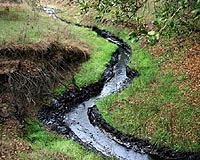| . |  |
. |
New Orleans, Louisiana (AFP) July 4, 2010 Efforts to clean up the Gulf of Mexico oil spill ramped back up Sunday as skimming operations resumed in Louisiana after a five-day shutdown due to Hurricane Alex. High seas kept skimming vessels tied up in harbor in three other southern US states and no controlled burns were being carried out, but officials said other operations to fend off the spill, including the laying of boom, were on again. "We are skimming today in Louisiana, but not in Alabama, Mississippi and Florida," Coast Guard spokeswoman Stephanie Hebert told AFP. Skimming was suspended on Tuesday as Tropical Storm Alex, which later became the first Atlantic hurricane of the year, entered the Gulf. British energy giant BP now hopes a giant Taiwanese supertanker, "A Whale," can exponentially boost the amount of oil and water mix being scooped up from the surface of the sea. "It is on location, it is being tested as we speak by a combination of the Navy, Coast Guard, and BP folks," BP spokesman Bryan Ferguson told AFP. "The ship was modified to facilitate skimming... so basically what they're doing is making sure it works." The tanker should be able to vacuum up 21 million gallons of oily water a day, separate it, and spit the seawater back out. By comparison, only 28.2 million gallons has been collected in total by smaller skimming boats over the last 10 weeks. Tests on the 300-yard (275-meter) long tanker-turned-skimmer were expected to be completed by Monday before a decision is made on its suitability. Seventy-five days into the spill, sparked by a deadly April 20 explosion on the BP-leased Deepwater Horizon rig, some 444 miles (715 kilometers) of shoreline has been fouled in four southern US states. The spill has endangered livelihoods throughout the region and even put a damper on Independence Day celebrations Sunday. In Grand Isle, Louisiana, American flags were flying, but instead of a day on the beach and fishing rodeos, families were filling inflatable swimming pools just yards from shuttered seafood restaurants. "I haven't stepped on the beach in weeks now," said Amy Lafourt, a bartender at Artie's, a beachfront bar and music club. Kenneth Feinberg, the administrator of a 20-billion-dollar BP fund to compensate those affected, told "Fox News Sunday" he would try to "maximize" payouts. "You have to look at each and every case," said Feinberg, a prominent lawyer who also oversaw a fund for victims of the September 11, 2001 attacks. "Physical presence of oil should not and will not be the only requirement." "I'm working for the people in the Gulf. I want to try and maximize as much compensation as I can do fairly and consistently to the people I'm trying to serve down there." Estimates suggest between 35,000 and 60,000 barrels of oil per day is gushing into the sea. An operation to permanently cap the well cannot begin until engineers finish drilling a relief well, in mid-August at the earliest. If the higher estimate is correct, the spill would arguably be the biggest ever, having surpassed the 1979 Ixtoc blowout, which took nine months to cap and dumped an estimated 3.3 million barrels into the Gulf of Mexico. The only bigger oil disaster would be the deliberate release of six to eight million barrels of crude by Iraqi troops who destroyed tankers and oil terminals and set wells ablaze in Kuwait during the 1991 Gulf War. A containment system involving two ships has so far captured some 585,400 barrels of crude, but the rough seas have delayed the deployment of a third vessel that could boost capacity from 25,000 barrels to 53,000 barrels a day. Officials hope they can move the third vessel, the Helix Producer, into place this week, and once it begins working they will also be able to refine their estimates of just how much oil is leaking. They must then decide if the existing system should stay in place or if it would be best to undergo a risky procedure to install another system capable of capturing up to 80,000 barrels of oil a day. In addition to boosting capacity, the new system would also greatly reduce the amount of time oil could gush freely into the sea if crews had to evacuate due to a bad storm.
Share This Article With Planet Earth
Related Links Our Polluted World and Cleaning It Up
 Oil spills blight Nigeria's creeks
Oil spills blight Nigeria's creeksBodo, Nigeria (AFP) July 2, 2010 The waters around the Niger Delta swamps of Bodo are covered in a thick film of oil that has left the once lush mangroves looking like burnt twigs covered in grease. The air reeks of crude. "I struggle everyday," said fisherman Gaagaa Giadom, 60, paddling his blackened canoe through the meandering oil-coated creeks. These days he is forced to cast his nets deep into the high seas to catc ... read more |
|
| The content herein, unless otherwise known to be public domain, are Copyright 1995-2010 - SpaceDaily. AFP and UPI Wire Stories are copyright Agence France-Presse and United Press International. ESA Portal Reports are copyright European Space Agency. All NASA sourced material is public domain. Additional copyrights may apply in whole or part to other bona fide parties. Advertising does not imply endorsement,agreement or approval of any opinions, statements or information provided by SpaceDaily on any Web page published or hosted by SpaceDaily. Privacy Statement |